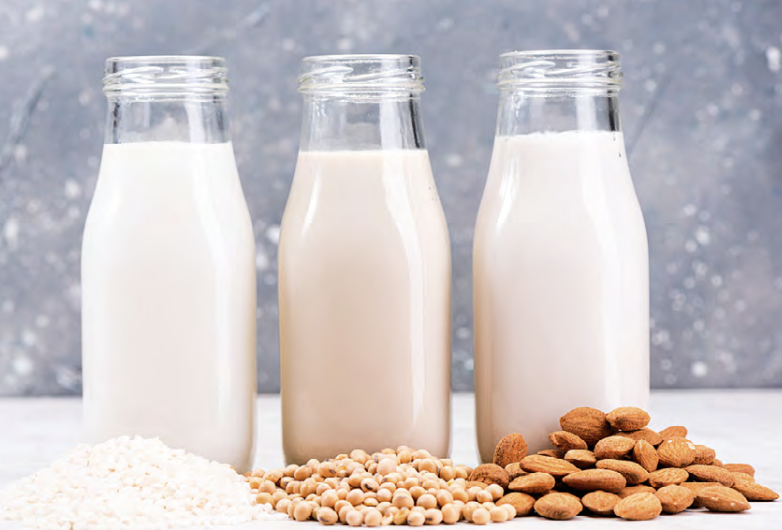By Wendy Haaf
Are plant-based beverages such as soy, rice, almond, and oat milks healthy?
People who prefer not to consume animal products today have a dizzying array of options when it comes to plant-based alternatives to milk—from those listed above to those made from cashew, hemp, coconut, and even yellow peas. But the nutritional profiles of these products can vary enormously, even among brands. So what should you look for?
Protein
Check the nutrition facts panel under “protein.” “Research suggests that older adults need more protein than younger adults,” says Heather Keller, a registered dietitian, professor, and Schlegel Research Chair in Nutrition and Aging at the University of Waterloo. “Soy has the same amount of protein as cow’s milk—about eight grams per 250 millilitres. Whereas almond or oat beverages have very little protein unless they’re fortified with it.” For example, non-enriched almond and coconut milks contain one and zero grams, respectively. (Almond milk is, in fact, mostly water.) Another good choice for protein is pea milk: one Canadian brand is on a par with soy, with eight grams.
Leucine
Both soy and pea milks have another advantage over other plant-based beverages: they contain more leucine, an amino acid that helps build muscle. Whey and casein—proteins in regular milk—are rich in leucine. “If you’re concerned about muscle accretion, cow’s milk is still probably a better choice, but if you want to move to a plant-based milk, soy would be best, because it’s next-highest after milk,” Keller explains.
Calcium
“Another key concern is calcium,” Keller says. Many plant-based beverages are fortified to levels similar to that of regular milk: between 315 and 330 milligrams per 240-millilitre serving versus the roughly 300 milligrams in cow’s milk. (The recommended daily calcium intake for those aged 51 to 70 is 1,000 milligrams for men and 1,200 for women; for those 50 or younger, it’s 1,000 for both men and women, and for those 71 or older, it’s 1,200 for both.) Coconut is lower—around 220 milligrams.
However, there’s another consideration: the type of calcium added to plant-based beverages is very similar to that found in pills, Keller notes. While the evidence is mixed, taking supplemental calcium rather than consuming foods that naturally contain it may slightly increase heart-disease risk.
Vitamin D
In Canada, cow’s milk is fortified with vitamin D, as are many—but not all—brands of plant-based alternatives. So when you’re comparing different options, “read the labels to make sure the product is truly fortified,” Keller stresses. Still, she adds, “most of us don’t get enough vitamin D even if we consume these fortified beverages, so people should talk to their doctor about taking a supplement.”
Vitamin B12
After age 50, our ability to obtain this nutrient from the foods in which it’s found naturally (such as meat) can decline. But because the body processes the version used in supplements and B12-enriched foods and beverages differently, it’s more easily absorbed. It’s worth asking your primary-care provider about getting a blood test to determine if you’re getting enough, since low B12 levels can lead to problems including fatigue, memory loss, and confusion.
Micronutrients
While most plant-based beverages lack important micronutrients, those made from soy and pea have levels of phosphorous, magnesium, zinc, and selenium comparable to those in cow’s milk.
To learn more about which plant-based beverage best suits your needs, consult a registered dietitian; for tips on finding one in your area, visit the Dietitians of Canada website.





